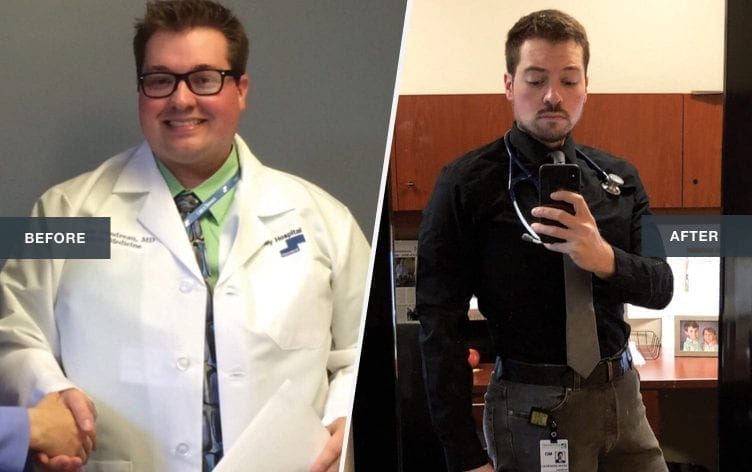
This Doctor Took His Own Advice and Turned Around His Own Health
When he began practicing as a physician, Kevin Gendreau remembers how often he would want to counsel patients to lose weight as a major step in their healthcare journey. But he held back because he felt like a hypocrite.
“Here I was, this doctor who’s trying to help people do everything they can to be healthy, and I was 300 pounds,” he recalls. “I was eating the kind of toxic food that I didn’t want my patients having, and yet it was a daily habit.”
Gendreau felt particularly frustrated by his weight since he hadn’t struggled with the issue until medical school. Growing up, he was fit and active, focusing on running and martial arts. But when he went to college, his father was diagnosed with metastatic melanoma, which kicked off a downward spiral for his dad — and an eating issue for Gendreau.
“Instead of the ‘freshman 15,’ I piled on the ‘freshman 50’ instead, and it just got worse from there,” he says. His once-steady weight of 175 kept climbing upward as he stress-ate his way through every processed carb he could grab.
By the time he became a full-fledged doctor in 2014, Gendreau was suffering from an array of weight-related issues, including hypertension, diabetes and sleep apnea, along with serious depression. But the stress of being a new doctor, and even the emergence of those chronic, dangerous conditions, didn’t change his bad eating habits.
Then, his sister was diagnosed with terminal cancer and everything changed.
“My sister was dealt this awful hand, she didn’t have a choice,” he says. “But I realized that I had the choice about being there for her children, who were only 2 and 6 when she passed. I realized I could either continue on this path of destruction, or I could step up and be the uncle those kids needed.”
Gendreau took the healthy direction and has never looked back. He started tracking his food through MyFitnessPal and adopted a diet of whole foods with no processed carbs or refined sugars. He sticks with fruits and vegetables, plenty of nuts, lean protein, legumes, healthy fats and low-sugar yogurt.
Along the way, he also implemented intermittent fasting, sticking to an 8-hour eating window followed by a 16-hour fasting period. As he added an activity tracker and more exercise into his routine, Gendreau kept dropping around two pounds per week and is now back to his pre-college weight of 175 pounds.
The weight loss resolved his chronic health issues so much that he’s off all medications, and he’s found his patients are responding to the change as well.
“I didn’t anticipate this, but as I was losing weight, it became a huge motivating force for many of my patients,” he says. “They’ve been losing weight along with me. And I think this whole process has made me a better doctor, for everyone. Because I can empathize with what it’s like to get out of control, and then to try to get back on track.”
His advice for anyone looking to make that shift is to find a good reason to change. For him, just thinking of his sister’s children was enough. But he’s convinced everyone has some strong, motivating factor they could tap into — whether it’s their own health or being there for loved ones.
Gendreau also suggests the “one day at a time” approach. Just track your calories, he suggests, and see how much you’re consuming. From there, you can start to make changes in the amount of calories and the types of foods you’re having every day.
“Remember that you have a choice here,” he says. “You can follow a toxic path or jump off it. And once you get on that healthy path, just keep going.”

































